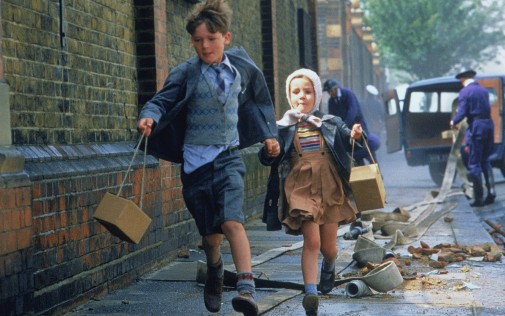 The kids of Best Picture nominee Hope and Glory
The kids of Best Picture nominee Hope and Glory
It's not often that we see child actors recognized in the film awards race. In many regards, that's understandable. Kids aren't known for being the most disciplined of performers and it seems unfair to expect them to deliver complex characterizations, or to embody concepts and ideas that they're still learning. Furthermore, while every acting job is a fruit born out of several people's labor – the actors themselves, directors, writers, editors, sound mixers, etc. – when the performer is as lacking in agency as a child, it's easier to attribute excellence to those other folks' craft. Nonetheless, good work is good work, and we should celebrate the greatness we see on-screen, regardless of how it came to be.
That brings us to 1987, the year of the next Smackdown, and a rare vintage that's stock full of brilliant performances by young artists. Curiously enough, the three Leading Actor performances paid special homage in this write-up all come from films about boys facing the harsh realities of World War II. First up, we have:
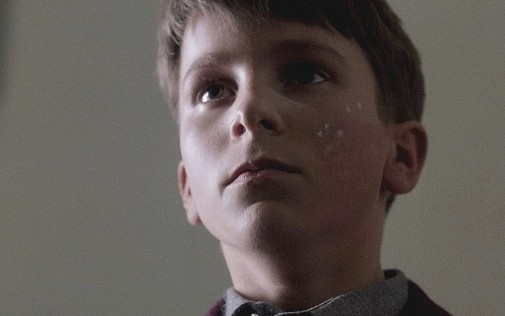
Christian Bale, EMPIRE OF THE SUN
Despite its epic proportions and Spielberg's typical appeal to sentiment and nostalgia, Empire of the Sun is, in its essence, a character study. Everything, from the staging of scenes to the use of choral music is meant to establish everything we see as an extension of the protagonist, an English son of privilege living in Shanghai when Japanese forces invade. Countless times, we are meant to see that Bale's Jim is unaware of the reality he lives in, sheltered to a spoiled degree, clouded by the veil of a happy childhood.
Because of that, the arc he goes through is all the more noticeable and felt deep within. Bale takes Jim from bratty exuberance, a Lord Fauntleroy who looks at warfare through rose-tinted glasses, to a husk of a person. It isn't merely a question of dying naivete and the pains of growing up, but the portrayal of someone whose spirit grows callous-like hardness through the friction of prolonged hardship. Even if this was a role given to an adult, Jim is one hell of a difficult character.
Bale, already an accomplished actor at the tender age of 13, tackles these challenges with the feverous abandon of an inspired master. He surrenders to Jim's early hysteria, his hunger, and crushed romanticism. Later, when the toll of war changes the boy, he chisels away at his soul. The light grows dim in his eyes, a cold cynicism shapes an impenetrable mask that shrouds the little hints of childishness still intact. Still, even after all that, the light inside hasn't died and Bale reveals it, at crucial times, to devastating effect.
Empire of the Sun is streaming on HBO Max.
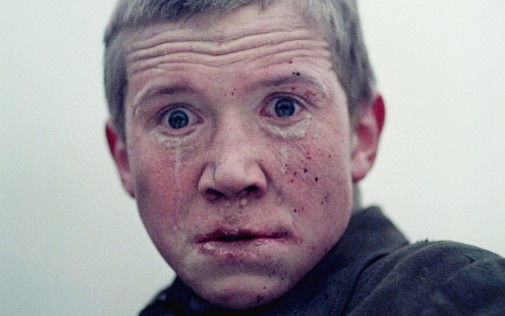
Aleksey Kravchenko, COME AND SEE
If Bale shows us a pampered romantic kid being crushed by the stomp of war, Kravchenko illustrates a boy used to hardship being completely emptied by the ravage of war, its cruelty, and doom. Come and See is closer to an immersive nightmare than to a character study, demanding that its cast be attuned to a heightened register, something beyond naturalism and closer to a demonic form of Expressionistic horror.
Whatever innocence Kravchenko gets to show, it's already been tainted by the time the camera finds him looking for ammunitions with a friend. His Flyora still smiles, but the marks of despair already show, little hairline cracks here and there like the tightness around his eyes, the roughness of his bark. We might not know it, but these hints of suffering are nothing compared to what's to come once the German troops force their way through the Soviet countryside. Deafening in its holler decrying Men's evil, Come and See is a descent into hell and Kravchenko's Flyora is our reluctant guide through its heinous circles.
The other actors in this write-up still get to keep a sliver of their humanity. Kravchenko gets no such gift, having to empty himself completely and utterly. Rumor has it that the experience of shooting Come and See made his hair start prematurely greying, which, while apocryphal, is quite credible. By the end of the picture he certainly doesn't look like a kid anymore, neither does he look like a man, not even an old man. Instead, he's the world scorched by malevolence beyond comprehension, wide-eyed at the things human-kind as done, his face sculpted into the fleshy mute twin of Munch's Scream. Once you've seen this film, you'll never forget Kravchenko's haunted look. It will follow you to the grave.
Come and See is streaming on the Criterion Channel.
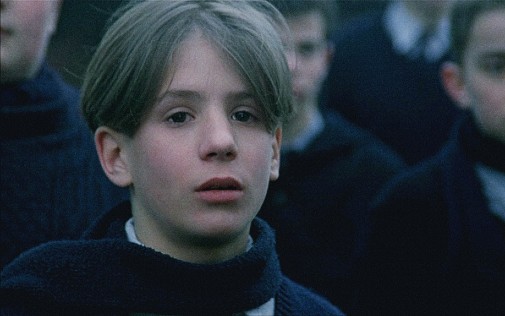
Gaspard Manesse, AU REVOIR LES ENFANTS
The theme of dying childhood during times of catastrophe is transversal to these three dramas. However, each picture deals with it in massively disparate ways. Empire of the Sun weaponizes the naïve perspective of its protagonist. Come and See assaults the viewer with apocalyptic sights of a world unraveling, its inhabitants flayed of their humanity. Louis Malle's Au Revoir Les Enfants takes a more realist approach, observing the process of growing up during World War II, rather than immersing the viewer in it.
At the center of the story, Manesse is Julien, child of a wealthy upper-class French family whose placid life in a boarding school is unnerved by the arrival of two new students. He becomes friends with one of them, Jean, and discovers that the other boy's Jewish and being hidden from the occupying Nazis by the school's priests. Through keeping his companion's secrets, Julien learns about the dark world he lives in, glimpsing outside the ivory tower built from familial heritage and pleasant living.
Malle drew inspiration from his own life, imbuing the project with calcinating power. To bring this story to the screen, he deposited immense trust in his young star, playing an avatar of his director and carrying a film that, for large swaths of runtime, depends on the minuscule changes of expression in the actor's face. It's an incredible performance, full of physical details that speak of a life lived outside the story's limits, vocal choices revealing class, and much more.
Even more impressive, is how internal Manesse's work is. Kravchenko delivered a performance of utmost abandon to extremes of existential anguish and Bale made his character's transformation beautifully transparent. Manesse, on the contrary, let's all of Julien's evolution live in the aborted movements, half-hearted gestures and fleeting nervous looks. When he waves goodbye, an invisible glow of defiance, a promise of affection, and fight. It's a tiny salute, but it carries worlds of meaning. Humanity is summarized in a timid wave.
Au Revoir les Enfants is streaming on HBO Max, Kanopy, and the Criterion Channel.
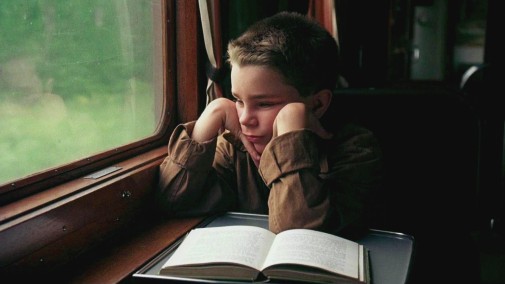 My Life as a Dog
My Life as a Dog
By no means are these the only examples of great child acting from the movies of 1987. They're simply the ones I'd have rewarded with Academy Award nominations.
Other acting feats of this surprisingly strong year for kids onscreen include My Life as a Dog's Anton Glanzellius, whose tic-ridden turn impresses for how it avoids cheap sentiment and portrays grief through underplayed sorrow. My Life as a Dog got nominations for its script and directing and probably got close to a Best Picture nomination. John Boorman's Hope and Glory actually conquered that coveted honor, and it also features a strong child performance. Sebastian Rice-Edwards may not be memorable exactly, but the young boy negotiates the picture's bizarre tonalities with aplomb, often besting his adult colleagues in this nostalgia-infused tale of the British home front during World War II.
No matter their age, these performers have earned our respect and adoration for their work illuminating the child's point of view in times of great misery.
Do you think any of these young thespians deserved Oscar nominations back in 1987? Are there any other child performances that year that you think were special?